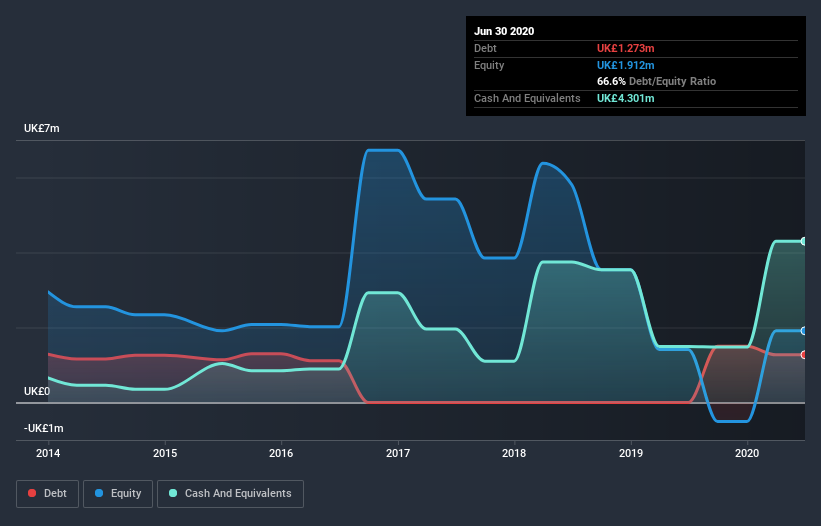- United Kingdom
- /
- Diversified Financial
- /
- AIM:PCIP
PCI-PAL (LON:PCIP) Has Debt But No Earnings; Should You Worry?
The external fund manager backed by Berkshire Hathaway's Charlie Munger, Li Lu, makes no bones about it when he says 'The biggest investment risk is not the volatility of prices, but whether you will suffer a permanent loss of capital.' So it seems the smart money knows that debt - which is usually involved in bankruptcies - is a very important factor, when you assess how risky a company is. As with many other companies PCI-PAL PLC (LON:PCIP) makes use of debt. But is this debt a concern to shareholders?
Why Does Debt Bring Risk?
Debt and other liabilities become risky for a business when it cannot easily fulfill those obligations, either with free cash flow or by raising capital at an attractive price. In the worst case scenario, a company can go bankrupt if it cannot pay its creditors. However, a more usual (but still expensive) situation is where a company must dilute shareholders at a cheap share price simply to get debt under control. Of course, debt can be an important tool in businesses, particularly capital heavy businesses. The first step when considering a company's debt levels is to consider its cash and debt together.
Check out our latest analysis for PCI-PAL
What Is PCI-PAL's Net Debt?
The image below, which you can click on for greater detail, shows that at June 2020 PCI-PAL had debt of UK£1.27m, up from none in one year. However, its balance sheet shows it holds UK£4.30m in cash, so it actually has UK£3.03m net cash.

A Look At PCI-PAL's Liabilities
We can see from the most recent balance sheet that PCI-PAL had liabilities of UK£5.74m falling due within a year, and liabilities of UK£1.60m due beyond that. Offsetting these obligations, it had cash of UK£4.30m as well as receivables valued at UK£2.34m due within 12 months. So it has liabilities totalling UK£698.0k more than its cash and near-term receivables, combined.
Given PCI-PAL has a market capitalization of UK£24.3m, it's hard to believe these liabilities pose much threat. But there are sufficient liabilities that we would certainly recommend shareholders continue to monitor the balance sheet, going forward. While it does have liabilities worth noting, PCI-PAL also has more cash than debt, so we're pretty confident it can manage its debt safely. There's no doubt that we learn most about debt from the balance sheet. But it is future earnings, more than anything, that will determine PCI-PAL's ability to maintain a healthy balance sheet going forward. So if you want to see what the professionals think, you might find this free report on analyst profit forecasts to be interesting.
Over 12 months, PCI-PAL reported revenue of UK£4.4m, which is a gain of 56%, although it did not report any earnings before interest and tax. With any luck the company will be able to grow its way to profitability.
So How Risky Is PCI-PAL?
By their very nature companies that are losing money are more risky than those with a long history of profitability. And we do note that PCI-PAL had an earnings before interest and tax (EBIT) loss, over the last year. Indeed, in that time it burnt through UK£3.0m of cash and made a loss of UK£4.1m. With only UK£3.03m on the balance sheet, it would appear that its going to need to raise capital again soon. PCI-PAL's revenue growth shone bright over the last year, so it may well be in a position to turn a profit in due course. Pre-profit companies are often risky, but they can also offer great rewards. There's no doubt that we learn most about debt from the balance sheet. But ultimately, every company can contain risks that exist outside of the balance sheet. For example, we've discovered 3 warning signs for PCI-PAL that you should be aware of before investing here.
At the end of the day, it's often better to focus on companies that are free from net debt. You can access our special list of such companies (all with a track record of profit growth). It's free.
If you’re looking to trade PCI-PAL, open an account with the lowest-cost* platform trusted by professionals, Interactive Brokers. Their clients from over 200 countries and territories trade stocks, options, futures, forex, bonds and funds worldwide from a single integrated account. Promoted
New: Manage All Your Stock Portfolios in One Place
We've created the ultimate portfolio companion for stock investors, and it's free.
• Connect an unlimited number of Portfolios and see your total in one currency
• Be alerted to new Warning Signs or Risks via email or mobile
• Track the Fair Value of your stocks
This article by Simply Wall St is general in nature. It does not constitute a recommendation to buy or sell any stock, and does not take account of your objectives, or your financial situation. We aim to bring you long-term focused analysis driven by fundamental data. Note that our analysis may not factor in the latest price-sensitive company announcements or qualitative material. Simply Wall St has no position in any stocks mentioned.
*Interactive Brokers Rated Lowest Cost Broker by StockBrokers.com Annual Online Review 2020
Have feedback on this article? Concerned about the content? Get in touch with us directly. Alternatively, email editorial-team@simplywallst.com.
About AIM:PCIP
PCI-PAL
Through its subsidiaries, engages in the provision of payment card industry (PCI) compliance solutions and telephony services primarily in the United Kingdom, the United States, Canada, rest of Europe, and the Asia Pacific.
Acceptable track record with mediocre balance sheet.
Market Insights
Community Narratives



